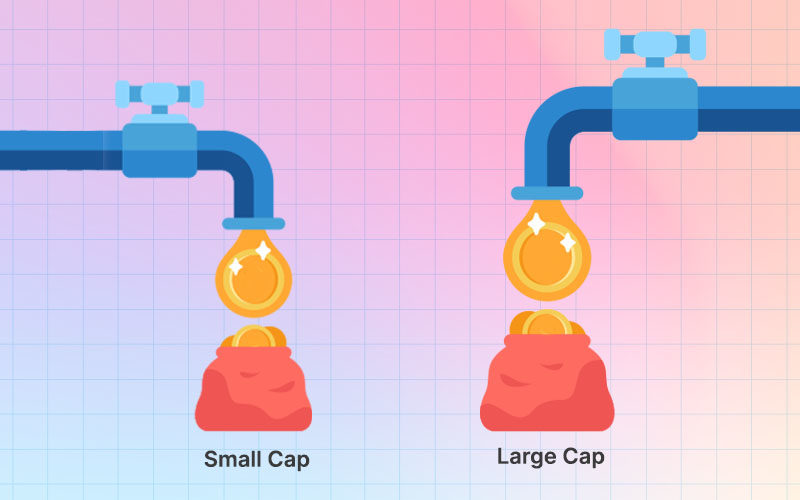Small cap funds are the funds that invest in stocks of small-capitalization companies. As these companies are small-sized, they have a great potential to grow to large capital businesses and deliver profitable returns to their investors. Being a sub-category of equity funds, these funds are known to be high-risk-return investments. Let’s learn about its features and investment strategies in this blog.
Small Cap Funds – Meaning & Investment Profile
Small-cap funds are necessarily equity funds that allocate a major section of the funds to small company stocks. The Securities and Exchange Board of India (SEBI) lays down the list of top companies as well as the norms for the investment portfolio of different kinds of funds. Small-cap stocks are the ones that are beyond the top 250 companies in the SEBI list and are often unheard of. Fund managers look out for such small-capitalization stocks that are constantly performing in the market and sometimes outperforming the benchmark indices and large-cap stocks. They invest in such stocks that have the capacity to be big businesses in the future and deliver good returns to investors. Therefore, small-cap fund investors can ditch the institutional and large-cap investors to capitalize over small-sized companies. Small-cap funds can deliver better returns than large-cap or medium-cap funds in the bull markets as small companies can grow up to their full potential.
Features
Some notable features that define small-cap funds include the following points-
- As per SEBI mandate, small-cap funds must invest more than 65% of the fund corpus in small stocks
- They are capable of giving very high returns as they offer more room for growth
- Although small-cap funds can deliver very high returns, sometimes taking over other equity-oriented funds under favorable conditions, they also come with high risks. These companies lack the financial resources to combat the tough market conditions and may succumb to bearish markets. Hence, they are highly volatile
- Small-cap funds can deliver substantial returns in the long term because the small companies will take time to outshine in the market
Should You Invest in Small-Cap Funds?
Before making any investment decision, investors should plan their investment goals, the time duration they wish to stay invested before they reap the fruits of it and their risk profiles. Then, check out the investment avenues that are in alignment with your plans and mutual funds that suit your purpose. Here are a few things to consider before investing in small-cap funds:
- Capital Appreciation
Invest in small-cap funds if you intend to have significant capital appreciation. Equity funds are meant for wealth creation and small-cap funds focus on growth opportunities that can create a valuable asset for the investors. Small-cap funds’ inclusion in the investment portfolio will not only diversify it but also balance it. Suppose your large-cap investments are not giving returns as per expectations, then small-cap funds may outdo them. When market movements impact small-cap funds’ returns, large-cap funds will stabilize the portfolio returns.
- Long-Term Investment Horizon
Small-cap funds are suitable for investors with a long-term investment horizon of at least 5 or 7 years. Small-cap stocks are underlying assets with massive potential and aggressive expansion strategies for growth, but it will take some time to realize their value in the market. So, stay invested for a longer duration to enjoy the benefits through fantastic capital returns.
- High-Risk Tolerance
Small-cap funds are suitable for investors with high-risk tolerance as they are highly susceptible to market volatility. These funds definitely give investors an opportunity to earn good returns as they confer more growth. However, they lack the financial strength and organizational stability of large-cap stocks. Therefore, small-cap funds are incredibly volatile and not suited for risk-averse investors.
Other than the above-mentioned points, always check the past performance history of the funds as well as the fund houses/AMCs (Asset Management Companies). Check the Expense Ratio, the performance of the competitor funds, and most importantly, the investment portfolio of the funds released by the fund houses. The detailed descriptions contain information about the stocks in which they are invested and in what proportions. This way you can know the companies and the sectors in which the fund’s corpus has been utilized. This will help you as an investor to make an assessment of the concentration risks (if sectors aren’t diversified) and credit risks (if small companies are not quality stocks). Nevertheless, fund managers take very calculated risks and thoroughly research before investing.
Also Read: What are Mid Cap Funds
Wrapping it up:
Small-cap funds, which means small-capitalization funds are equity mutual funds that invest majorly in stocks of small companies. Fund-managers invest in equities of small-sized companies that have shown positive signs of growth and a potential to be large-sized companies in the future. Early investors can get excellent returns on such stocks and therefore the fund managers of smallcap funds bet the fund money on it.
On the flip side, these funds are hugely influenced by market movements as their NAV (Net Asset Value) gets a dip in the bear market. This is because historically they lack the stability of the large-cap funds due to the smaller size of capitalization. So, it is apt for investors with high-risk appetites who can invest for the long term. It is advisable to include small-cap funds in your investment portfolio with funds that have been performing well for the past 3 to 5 years. Invest some percentage of your total investments in these funds to diversify the portfolio and earn good returns.










